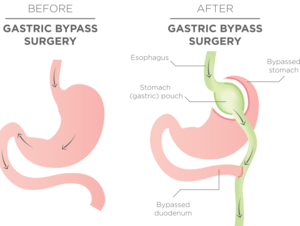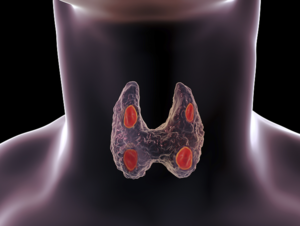Over the last few years my calcium levels have been a little low, between 8.8 and 9.1 mg/dl. My PTH levels have been very high, up to 200 pg/ml. I had a gastric bypass 7 years ago, and one doctor told me that the PTH was a result of that. Another doctor told me that I have primary hyperparathyroidism and need surgery to remove a parathyroid tumor. Do I have primary hyperparathyroidism? Do I need surgery?


This clinical picture is most consistent with secondary hyperparathyroidism (not primary) due to intestinal malabsorption of calcium (as a result of the gastric bypass).
Secondary hyperparathyroidism occurs when blood calcium levels are chronically low. Most people should have calcium levels in the mid to high 9s in mg/dl, or between 2.32 and 2.5 mmol/l. If calcium levels are consistently below this (as yours are), then the parathyroid glands will try harder to get the calcium up, and they do this by releasing more parathyroid hormone (PTH). In this condition, you do not have a parathyroid tumor. Rather, all four parathyroid glands are making more hormone to try to get the calcium up.
Gastric bypass surgery prevents you from being able to absorb enough calcium from your intestines. Most active absorption of calcium in the intestines occurs in the duodenum, the first part of the small intestine. During a gastric bypass, the duodenum is physically bypassed, so the food does not encounter the area where most active calcium absorption can occur. This leads to chronic malabsorption of calcium, which leads to a low blood calcium level. Your parathyroid glands respond to this and make more parathyroid hormone (PTH). Remember that the role of the parathyroid glands is to keep your calcium level in normal range. If your calcium level drops, your parathyroid glands sense this and produce more PTH, which then takes calcium out of your bones to get your blood calcium level up. If you are not taking calcium and Vitamin D supplements daily, and your calcium remains on the low end for a long time, the PTH level can get quite high. The first line treatment for this is to try to get the calcium up into the mid to high 9s (mg/dl) with aggressive calcium and Vitamin D supplementation. Most people with secondary hyperparathyroidism after a gastric bypass do not need surgery - they just need calcium and Vitamin D supplementation. Occasionally, someone will need surgery for this, though. Surgery might be indicated if you get your calcium up into the mid 9s (mg/dl), but your PTH level is still well over 100 pg/ml. This would indicate that the parathyroid glands were no longer responding appropriately to the calcium, because they were overactive for so long. In this case, a subtotal parathyroidectomy (removing 3.5 parathyroid glands) may be necessary to get the PTH back down to a reasonable level. This is not the first step, though. Taking lots of calcium and Vitamin D is the first step.



